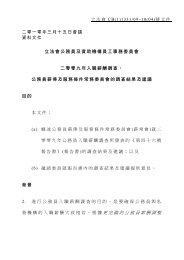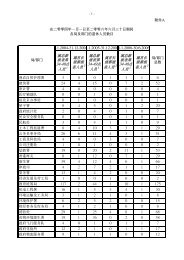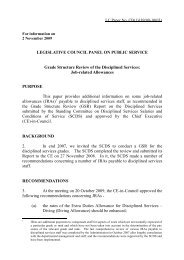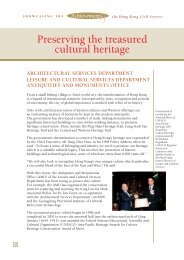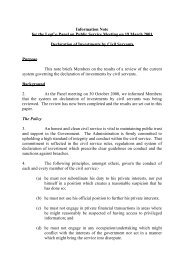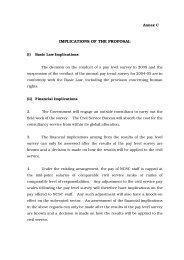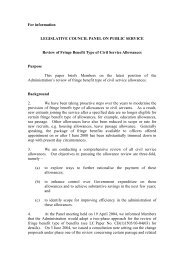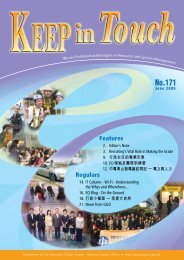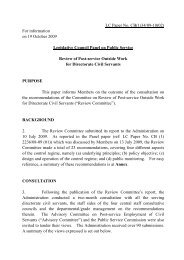LC Paper No. CB(1)1832/01-02(02) LegCo Panel on Public Service ...
LC Paper No. CB(1)1832/01-02(02) LegCo Panel on Public Service ...
LC Paper No. CB(1)1832/01-02(02) LegCo Panel on Public Service ...
Create successful ePaper yourself
Turn your PDF publications into a flip-book with our unique Google optimized e-Paper software.
- 2 -<br />
employment <strong>on</strong> a lower salary. However, a large proporti<strong>on</strong> of civil servants<br />
have permanent c<strong>on</strong>tracts that cannot be terminated by notice. For those<br />
without permanent c<strong>on</strong>tracts, the terminati<strong>on</strong> route is theoretically possible.<br />
But the prospect of dismissing civil servants en masse, with no guarantee that<br />
they would accept re-employment <strong>on</strong> lower salaries, would raise serious<br />
c<strong>on</strong>cerns about the smooth operati<strong>on</strong> of the Government, and of deliveries of<br />
services to the public.<br />
7. It has been suggested that there is a further route open to the<br />
government, namely to reach an agreement with the civil service. However,<br />
even if such an agreement were reached with civil service central c<strong>on</strong>sultative<br />
councils, it would not prevent individual civil servants from challenging any<br />
agreed pay reducti<strong>on</strong>.<br />
8. Faced with these difficulties, the <strong>on</strong>ly safe way to achieve a lawful<br />
reducti<strong>on</strong> in civil service pay is through legislati<strong>on</strong>. If legislati<strong>on</strong> to reduce<br />
pay is enacted the risk of a successful legal challenge would be significantly<br />
reduced.<br />
Basic Law issues<br />
9. But if there is to be a civil service pay reducti<strong>on</strong>, would it be lawful<br />
and c<strong>on</strong>sistent with the Basic Law? And if so, would any legislati<strong>on</strong> to give<br />
effect to such pay reducti<strong>on</strong> be c<strong>on</strong>sistent with the Basic Law?<br />
10. Article 100 provides that public servants serving in all H<strong>on</strong>g K<strong>on</strong>g<br />
government departments before the establishment of the H<strong>on</strong>g K<strong>on</strong>g SAR “may<br />
all remain in employment and retain their seniority with pay, allowances,<br />
benefits and c<strong>on</strong>diti<strong>on</strong>s of service no less favourable than before.” Assuming<br />
that the pay reducti<strong>on</strong> does not make the salaries of civil servants lower than<br />
they were <strong>on</strong> 30 June 1997, there would be no breach of that Article.<br />
11. Moreover, in a case decided in 1998, the court held that Article 100<br />
was intended to ensure c<strong>on</strong>tinuity of employment so that no public servant<br />
suffers as a c<strong>on</strong>sequence of the transiti<strong>on</strong> itself, but was not intended to inhibit<br />
the introducti<strong>on</strong> of new measures for the good governance of H<strong>on</strong>g K<strong>on</strong>g. The<br />
Associati<strong>on</strong> of Expatriate Civil Servants had challenged the introducti<strong>on</strong>, after<br />
Reunificati<strong>on</strong>, of a Chinese language proficiency requirement for those civil<br />
servants who wished to transfer to permanent terms of service. After<br />
explaining the purpose of Article 100, the court held that it had not been<br />
breached by the introducti<strong>on</strong> of this new requirement.<br />
12. Article 103 of the Basic Law provides that H<strong>on</strong>g K<strong>on</strong>g’s previous<br />
system of management for the public service, including special bodies for




